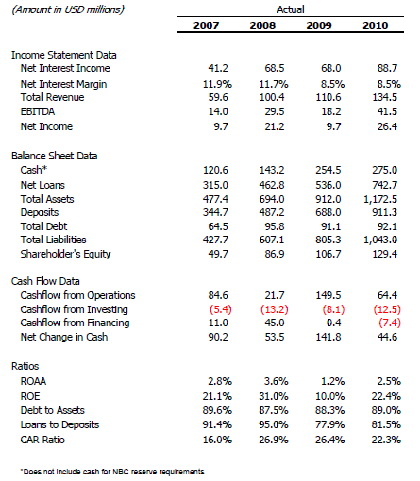Some weeks ago I had a conversation with Douglas Clayton. We discussed Cambodia – The New Emerging Market, and it’s inevitable transformation from sleepy backwater into economic up-and-comer. It’s got a long way to go, but that’s why the opportunity is so intriguing.
In the course of the conversation we both commented on the fact that we seek to actively invest in markets which are uncorrelated to the indebted West. This has in fact been a core strategy for Leopard Capital, of which Doug is the founder and CEO.
Markets like (our favourite) Mongolia, Sri Lanka, and Myanmar.
Today we wanted to highlight this particular point so that any unconverted readers who are still long the S&P, Dow, FTSE, DAX (“insert chosen index here”) will understand exactly what we’re talking about.
Case in Point
One of Doug’s investments in Cambodia is a stake in Acleda Bank.
Now, if you could have picked a sector to invest in, both prior to, and during the financial chaos sh!tstorm that rained fecal mortgages and delinquent loans on the banking sector in 2008, would you have chosen the banking sector? – Nah, we didn’t think so.
The SPDR Select Financials (XLF) is as good a proxy on the US financial sector as you’re likely to find. Using the data from 2007 through 2010 it has shed over 61% of its stock price value.
Ivory tower economist pundits and jelly-heads in London, NY and such financial enclaves know that emerging and frontier markets are risky and dangerous. They tell us so on Bubblevision, so we know it’s true. The world is flat folks… really!
These same emerging markets exhibit this severe inferiority, and indeed immense danger by characteristically producing results such as those shown below.

That table shows Acleda Bank’s numbers throughout the crisis period. The same crisis period that saw the SPDR Select Financials shed the 61% mentioned above. Ouch!
We draw your attention to the CAR Ratio (Capital Adequacy Ratio). In a nutshell this shows the bank’s capital expressed as a percentage of the bank’s risk weighted credit exposure. Smack dab in the middle of the financial crisis it sat at a very healthy 26.9%.
In Cambodia it is typical for bankers to be personally liable for the loans on their books. Our friend Harris Kupperman discussed this some time ago here when visiting the country himself. (Side note: If you haven’t read Kuppy’s discussion with the CEO of one of Cambodia’s top banks then go and read it as soon as you finish this post.)
As Kyle Bass is fond of saying when referring to bankers who are personally liable for their balance sheets, “Their give a shit factor is very high.” That’s a direct quote.
I want to invest in markets where this is the mantra they live by, as opposed to say, oh I don’t know, the US or Europe…
Remember in March of 2009, when it was publicly disclosed that the American International Group (AIG) would bonus out approximately $218 million to employees of its financial services division?
This coming on the heels of $170 billion in taxpayer bailouts, and in the fourth quarter of 2008 posting a loss of $61.7 billion (the largest loss ever for any corporation). Soon after that it was discovered that bonuses company-wide could reach $1.2 billion.
I’ll bet if the criminals on the receiving end of these bonuses (read: thefts) were personally liable they would have acted a wee bit different..?
We believe Doug is correct in his investment thesis on emerging and frontier markets. People like Doug are in large part to blame for the wealth that Mark and I have managed to create. Damn them! Note to Doug – stop it!
But seriously, if any of our uber savvy readers know more smart guys like Doug please inform us immediately! We want to invest alongside them too.
On a side note: Doug has been visiting some very interesting places recently. We’ll bring some of what he has found to your attention, as the investments look appealing and the opportunity for us to participate in what he is doing with his own capital will present themselves later this year.
– Chris
“In individuals, insanity is rare; but in groups, parties, nations, and epochs it is the rule.” – Friedrich Nietzsche


